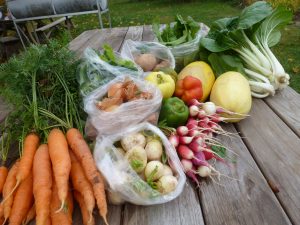by Janie Beck Kreider
Peace Farm, a new voluntary service program born out of a collaborative effort between Quakers and Mennonites in Bally, Pennsylvania, will begin its inaugural season in May 2015. This six-month apprenticeship brings together the practical work of farming and an exploration of connections between peace, food justice and faith.
Farmers Krista and Tim Showalter Ehst are excited to see their dream for Peace Farm become a reality. Tim and Krista operate Valley Run CSA (community-supported agriculture), a diversified, sustainable farm in the Butter Valley of southeastern Pennsylvania, about an hour outside of Philadelphia. Along with other local farmers, they will host Peace Farm apprentices for the daily work of cultivating organic vegetables, raising pastured animals and helping with various other agricultural tasks. As part of the hands-on apprenticeships, the Showalter Ehsts will also facilitate ongoing reflections with participants about what it means to approach agriculture and land cultivation through the lens of faith. Themes within the Peace Farm curriculum address scarcity and abundance, food deserts, migrant farm labor, sustainable living and rest, and agricultural practices as a form of peacemaking.
The Showalter Ehsts are not your average Mennonite farmers. Their journey toward this vocation and lifestyle began at Goshen College, where they studied theology and began learning about food production and distribution in the United States and abroad. Neither of them grew up farming, although Krista was raised in a 200-year-old farmhouse on 80 acres of Pennsylvania farmland, and Tim grew up in rural Virginia, outside of Harrisonburg. While at Goshen College and reading authors such as Wendell Berry, Michael Pollan, Vandana Shiva, and the like, the two decided to pursue a farming apprenticeship in Kentucky upon graduation. They’ve been interested in this type of work ever since.

“Coming off of studying theology and then moving right into learning about farming made both of us keen to find intersections between our faith commitment to Anabaptist-Mennonite theology and this work of tending to the land,” reflected Krista, who also pastors Alpha Mennonite Church in Alpha, New Jersey, a Franconia Mennonite Conference congregation. “We soon realized that our commitment to a lived discipleship found natural expression in the daily tasks of cultivating food in ways that respected the goodness of God’s creation and the interdependence of healthy human communities with healthy landscapes.”
Krista earned a Master of Divinity at Candler School of Theology at Emory University in Atlanta, while Tim helped start Oakleaf Mennonite Farm, a diverse urban farm on the six-acre property of Berea Mennonite Church, also in Atlanta. After getting the farm off to a good start, Tim took a position as interim director for DOOR (Discovering Opportunities for Outreach and Reflection) Atlanta, which is affiliated with Mennonite Mission Network. It was while Tim was at DOOR, working closely with young adult volunteers, that the dream for a faith- and farm-based voluntary experience began to take root.
“We knew that there were lots of experiences for young adults to spend a year in a faith-based voluntary service program, and we also knew that there were tons of farming internship opportunities,” says Tim. “But there weren’t many opportunities for young people to learn about sustainable agriculture through the lens of faith.”
It wasn’t long before this dream began to germinate. After moving back to Krista’s family farm in Pennsylvania and starting up a successful CSA (a cooperative farm where members help with start-up and operating costs in exchange for food), they began to brainstorm with Christina Repoley, one of Krista’s seminary friends who also directs Quaker Voluntary Service. Then Glenn Balzer, director of DOOR, joined the conversation. Quaker Voluntary Service and the DOOR program have signed on as program partners. The Showalter Ehsts also received a grant from the Fund for Theological Education that helped finance the development of the program.
“We began to imagine what it would look like for these peace churches to develop a program that centered on sustainable agriculture and food justice,” says Krista.
The inaugural season of Peace Farm will begin in May 2015. The experience is based on the rhythms of the farming year, so while most voluntary service programs start in August or September, Peace Farm will begin in late May. By the time they leave at the end of November, apprentices will have experienced not only the ins and outs of a sustainable farm, but will have engaged in essential conversations about how spirituality and faith commitments can inform a healthier relationship with the land.
This piece originally appeared as part of Mennonite Church USA’s #WeAreMenno series. Reprinted with permission.
The opinions expressed in articles posted on Mosaic’s website are those of the author and may not reflect the official policy of Mosaic Conference. Mosaic is a large conference, crossing ethnicities, geographies, generations, theologies, and politics. Each person can only speak for themselves; no one can represent “the conference.” May God give us the grace to hear what the Spirit is speaking to us through people with whom we disagree and the humility and courage to love one another even when those disagreements can’t be bridged.

